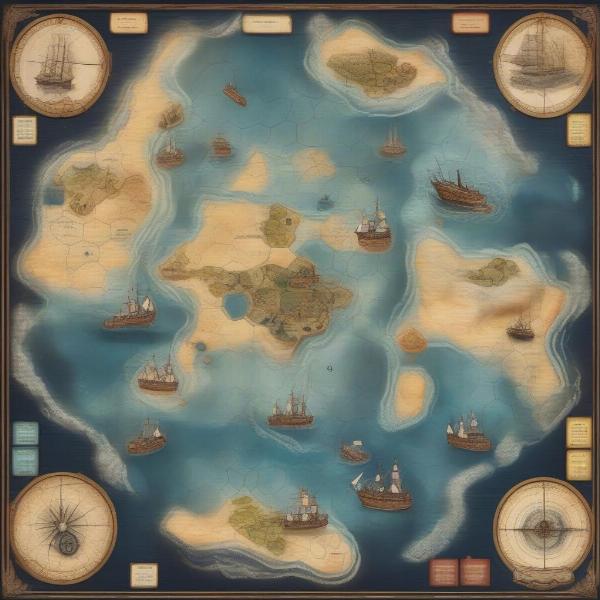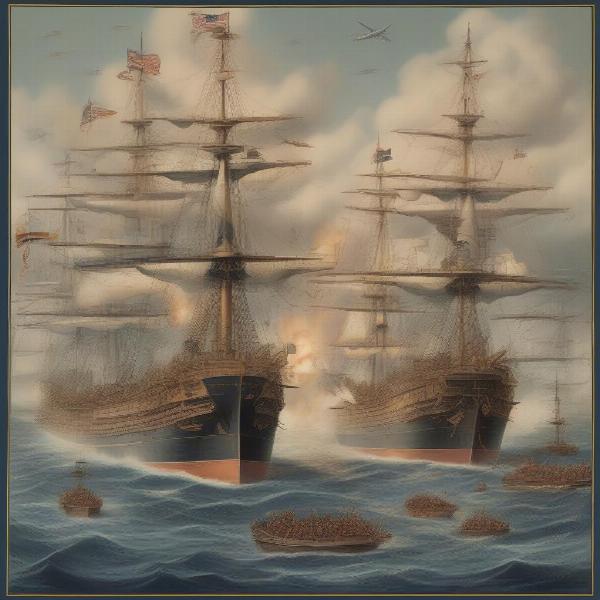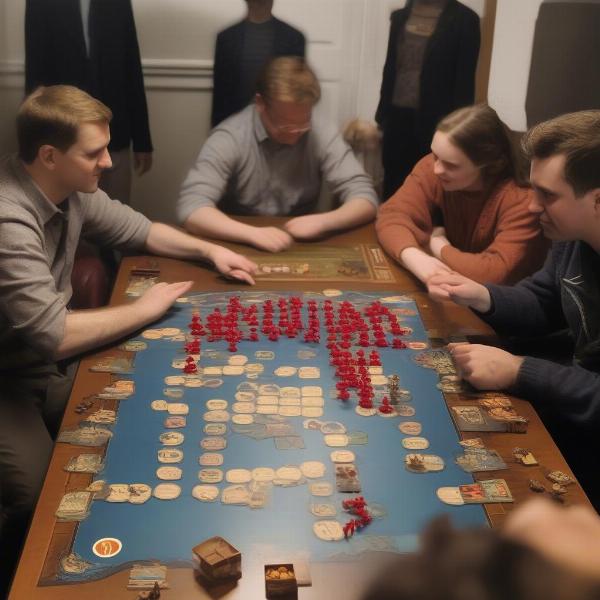Naval War Board Games offer a unique blend of strategic depth and historical simulation, captivating players with their intricate mechanics and immersive themes. On supremeduelist.blog, we strive to dissect these games, providing insights that elevate your gaming experience, whether you are a seasoned admiral or a fresh recruit to the maritime theatre of strategy. This article will explore the nuances of naval war board games, examining their core components, popular titles, and key strategic considerations.
We’ll explore how these games capture the essence of naval warfare, from managing your fleet’s resources to navigating treacherous waters and outmaneuvering your opponents. From classic hex-based games to more modern, card-driven systems, we’ll navigate the different styles and mechanics, highlighting what makes each one special. Prepare to chart a course through the strategic depths of naval board games.
What Defines a Naval War Board Game?
Naval war board games distinguish themselves by focusing on the tactical and strategic aspects of warfare conducted at sea. These games go beyond simple ship-to-ship combat, often incorporating elements like resource management, supply lines, naval intelligence, and even weather conditions. A good naval war board game allows players to recreate the challenges faced by historical naval commanders, requiring them to balance immediate engagements with long-term strategic goals. For example, games like war in the pacific board game expertly capture the vast scale of a multi-theater conflict.
Core Mechanics of Naval Warfare Games
Naval war board games employ a variety of mechanics, often including:
- Movement Systems: Representing the speed and maneuverability of ships, these can range from simple hex-based movement to more complex point-to-point or area movement systems.
- Combat Resolution: Systems vary, with some using dice rolls and combat tables, while others employ card-based systems or action point management.
- Resource Management: Players often need to manage resources such as fuel, ammunition, and repair crews to sustain their fleets.
- Technology and Upgrades: Games might allow players to research new technologies or upgrade their ships with better weaponry or defenses.
- Scenario and Campaign Design: Many naval war board games feature historical scenarios or elaborate campaign systems that immerse players in specific periods or conflicts.
Popular Naval War Board Games to Explore
The world of naval war board games is vast and varied, with numerous titles to suit every taste. Here are some of the noteworthy examples:
Classic and Historical Wargames
Many classic naval wargames focus on historical naval engagements, often using detailed maps, miniature ships, and complex rules systems. Titles such as Victory at Sea or Wooden Ships and Iron Men are iconic examples, providing deep tactical simulations of historical conflicts. These games emphasize historical accuracy and strategic depth. One particular title, russian war vessel on which a board game is played, adds a unique theme, offering a distinct perspective on historical naval conflict.
Modern Card-Driven Naval Games
Modern card-driven naval games often prioritize accessibility and ease of play, while still providing a strategic and engaging experience. These games use cards to represent actions, events, and technologies, streamlining the gameplay and emphasizing player choices. Games like Axis & Allies Naval Miniatures blend miniatures with card play, resulting in a dynamic experience.
Light and Accessible Naval Board Games
For those seeking less complex but still enjoyable naval combat experiences, there are lighter options that often use simpler rule sets and shorter playing times. Games like Battleship or battleship star wars edition game offer a more abstract representation of naval warfare, focusing on strategic positioning and tactical decisions without getting bogged down in complex mechanics.
 Naval Board Game Map
Naval Board Game Map
Strategic Considerations in Naval War Games
Success in naval war board games requires more than just luck; it requires careful planning, tactical thinking, and a deep understanding of the game mechanics. Here are some key strategic elements to consider:
Fleet Composition and Deployment
The composition of your fleet is crucial. Do you opt for a few powerful battleships or a larger number of smaller, faster cruisers and destroyers? Your fleet should be tailored to the specific scenario and the strategies you intend to employ. Deployment is equally important, carefully positioning your ships to control key areas of the map, establish blockades, or protect your supply lines.
Naval Maneuvering and Positioning
Naval battles often hinge on maneuverability and positioning. Understanding the movement rules and using terrain to your advantage is essential. You must outmaneuver your opponents, set up favorable combat positions, and avoid being trapped. This may mean using smaller craft to screen capital ships or using terrain to obscure your advance.
Resource Management and Logistics
Resource management is vital in many naval games. You must manage the flow of fuel, ammunition, and repairs to sustain your fleet over extended campaigns. Neglecting logistics can leave your ships vulnerable and your strategy in tatters. In some ways, this is similar to resource management seen in a total war star wars game where long term economic planning is crucial.
Adapting to Changing Conditions
Naval warfare is unpredictable, and you must be able to adapt to changing conditions. Weather, enemy movements, and unexpected events can throw your plans into disarray. A successful naval commander needs to think on their feet, adjust their strategy, and make the best of a given situation.
Mastering the Game Rules
Understanding the rules is important to have any success. Taking time to analyze the movement, combat and special actions can lead to success. Sometimes, less popular rules might be the most helpful.
 Naval Combat Tactics
Naval Combat Tactics
Tips for Improving Your Naval War Game Skills
To excel at naval war board games, here are a few tips:
- Study the Rules: Start by thoroughly understanding the rulebook, paying attention to movement, combat, and special abilities.
- Analyze Historical Examples: Studying historical naval battles can provide valuable insights into tactics, ship deployment, and strategic considerations.
- Experiment with Different Strategies: Don’t be afraid to try out different fleet compositions, tactics, and strategies to see what works best for you.
- Learn from Your Losses: Every loss is an opportunity to learn. Analyze what went wrong and adjust your approach accordingly.
- Practice Regularly: Consistent practice will hone your skills and allow you to better understand the nuances of the game.
According to naval strategy expert, Admiral Thomas Sterling, “The key to victory in naval warfare, whether on a tabletop or at sea, is understanding your enemy’s capabilities and exploiting their weaknesses. The game will test your adaptability and strategic thinking.” Another expert, Dr. Anya Petrova, specializing in historical naval warfare, notes “Studying the historical battles and understanding the constraints of the period can provide a crucial edge in strategy games.”
Why Choose a Naval War Board Game?
Naval war board games offer a unique and rewarding gaming experience, combining strategic depth with historical immersion. They challenge players to think critically, plan carefully, and adapt to changing conditions. Whether you enjoy the meticulous details of historical simulations or the streamlined accessibility of modern card-driven games, there is a naval war board game out there for everyone.
Furthermore, many of these games provide opportunities for social interaction and strategic discussion, fostering a sense of community and camaraderie among players. For players who want to delve even deeper into the tactical elements of warfare, exploring resources like sea war raid game tips could be beneficial.
 Naval Game Session
Naval Game Session
Conclusion
Naval war board games offer a fascinating blend of history, strategy, and tactical decision-making. They challenge players to think like naval commanders, managing resources, deploying their fleets, and outmaneuvering their opponents. On supremeduelist.blog, we are dedicated to bringing you insightful analysis and perspectives on these games, helping you navigate the strategic seas and elevate your gaming experience. Explore our site for more articles that enhance your gameplay. Dive into the deep strategic depths of naval war board games and chart your course to victory!
Leave a Reply